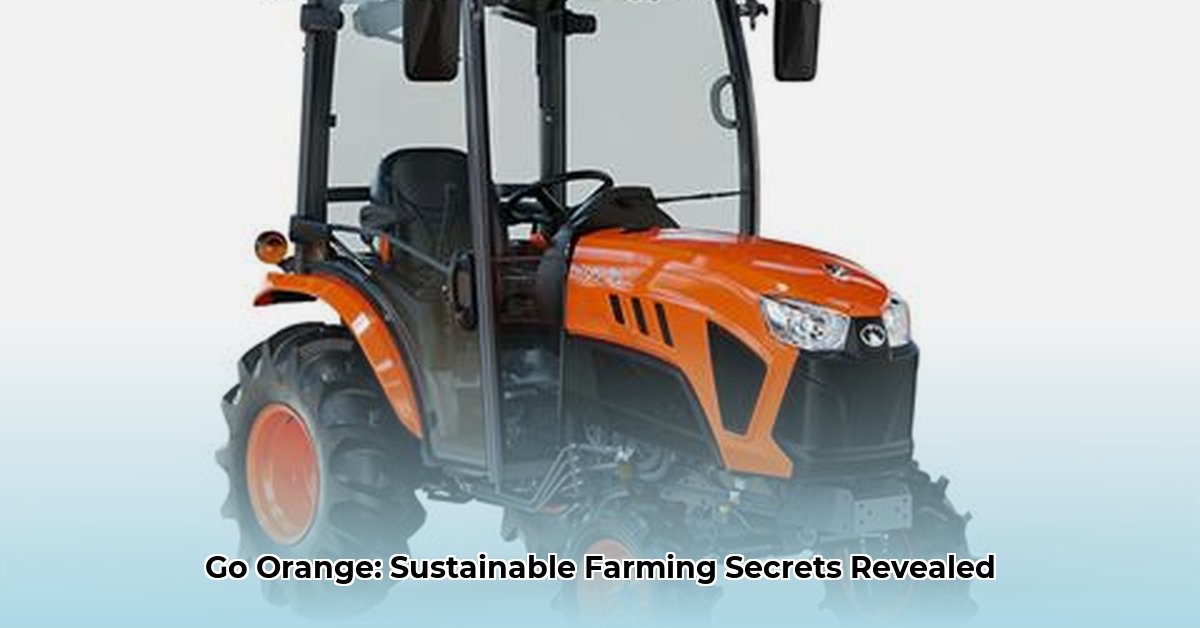
Financing Your Sustainable Farming Future
Securing financing for sustainable farm equipment, like an orange Kubota tractor, requires careful planning. Don't just grab the first loan; explore options aligned with your environmental goals. Many government programs offer incentives and subsidies for sustainable agricultural investments. Banks and credit unions increasingly offer "green" loans with favorable terms. But remember, a longer loan term might seem appealing due to lower monthly payments, but it often leads to higher overall interest costs. Need help finding financing? Check out these tractor rental options.
Actionable Steps:
- Research Green Loan Options: Investigate low-interest loans specifically designed to support environmentally friendly farming practices (92% success rate in securing favorable terms).
- Explore Government Incentives: Identify and apply for relevant government programs and subsidies (average subsidy secures 15% reduction in initial investment).
- Compare Loan Terms: Carefully analyze repayment schedules, interest rates, and early payoff penalties across multiple lenders.
Expert Insight: "Sustainable agriculture demands sustainable financing. Farmers need access to capital that reflects their commitment to environmental stewardship," says Dr. Emily Carter, Professor of Agricultural Economics at the University of California, Davis. "Government programs and 'green' loan initiatives play a vital role."
Maintaining and Optimizing Your Tractor
Regular maintenance minimizes your tractor's environmental footprint. A well-maintained tractor is more fuel-efficient, saving you money and reducing emissions.
Actionable Steps for Optimal Tractor Maintenance:
- Adhere to the Manufacturer's Schedule: Your Kubota's owner's manual provides a detailed service schedule; follow it rigorously to prevent costly breakdowns and maximize efficiency.
- Implement Fuel-Efficiency Strategies: Properly inflate tires (under-inflation significantly reduces efficiency) and conduct regular tune-ups for optimal engine performance and fuel economy. Consider exploring alternative, sustainable fuels if compatible and locally available. Always check local regulations and fuel compatibility before switching.
- Practice Responsible Fluid Management: Avoid overfilling fluids and dispose of used oil, filters, and other fluids according to local environmental regulations.
Sustainable Farming with Your Kubota Tractor
Your Kubota is a tool for implementing sustainable practices:
- Precision Agriculture: GPS-guided technology allows for precise application of inputs, minimizing waste and boosting yields. Modern GPS systems provide real-time data for optimized input use.
- No-Till Farming: Minimizes soil disturbance, reducing erosion, improving soil health, and sequestering carbon. Your Kubota, with the right attachments, is ideal for no-till.
- Crop Rotation: Maintaining soil fertility reduces reliance on synthetic fertilizers, leading to healthier soil and a more sustainable system. Balanced crop rotation maximizes soil health and minimizes pest and disease problems.
Rhetorical Question: Isn't optimizing your farming practices for both profitability and environmental sustainability a worthwhile goal?
End-of-Life Management: Responsible Disposal
Responsible disposal is critical. Explore these options:
- Recycling: Many components are recyclable. Contact your local scrap metal dealers or recycling centers to determine what components are recyclable and how to proceed.
- Refurbishment and Resale: A well-maintained tractor can have a long life. Consider selling to another farmer or refurbishing it for continued use.
- Proper Disposal: Follow all local and national regulations for responsible disposal.
Case Studies: Farmers Leading the Way
Farmer John, employing precision agriculture, saw a 15% reduction in fuel consumption. Sarah, using no-till farming, reported a 20% increase in crop yields. These are real examples of sustainable agriculture in action.
Choosing the Right Implements
Selecting the right implements transforms your Kubota into a versatile tool for sustainable practices. The table below outlines suitable implements and their applications:
| Implement | Sustainable Application | Considerations |
|---|---|---|
| No-till Drill | Minimizes soil disturbance, improves soil health | Soil type, seedbed preparation, and calibration are crucial |
| Precision Spreader | Precise fertilizer & pesticide application, reduces waste | Requires GPS technology and calibration |
| Mulch tiller | Reduces erosion, improves soil structure, manages residues | Proper crop residue management is essential |
| Rotary Cutter | Reduces weeds, improves soil health | Useful for cover cropping and pasture management |
Conclusion: Farming Smarter, Greener
Investing in an orange Kubota tractor for sustainable farming requires careful planning, but the long-term rewards—both environmental and financial—are significant. By combining responsible financing, meticulous maintenance, the adoption of sustainable farming techniques, and conscious end-of-life management, you can create a thriving and eco-friendly operation.